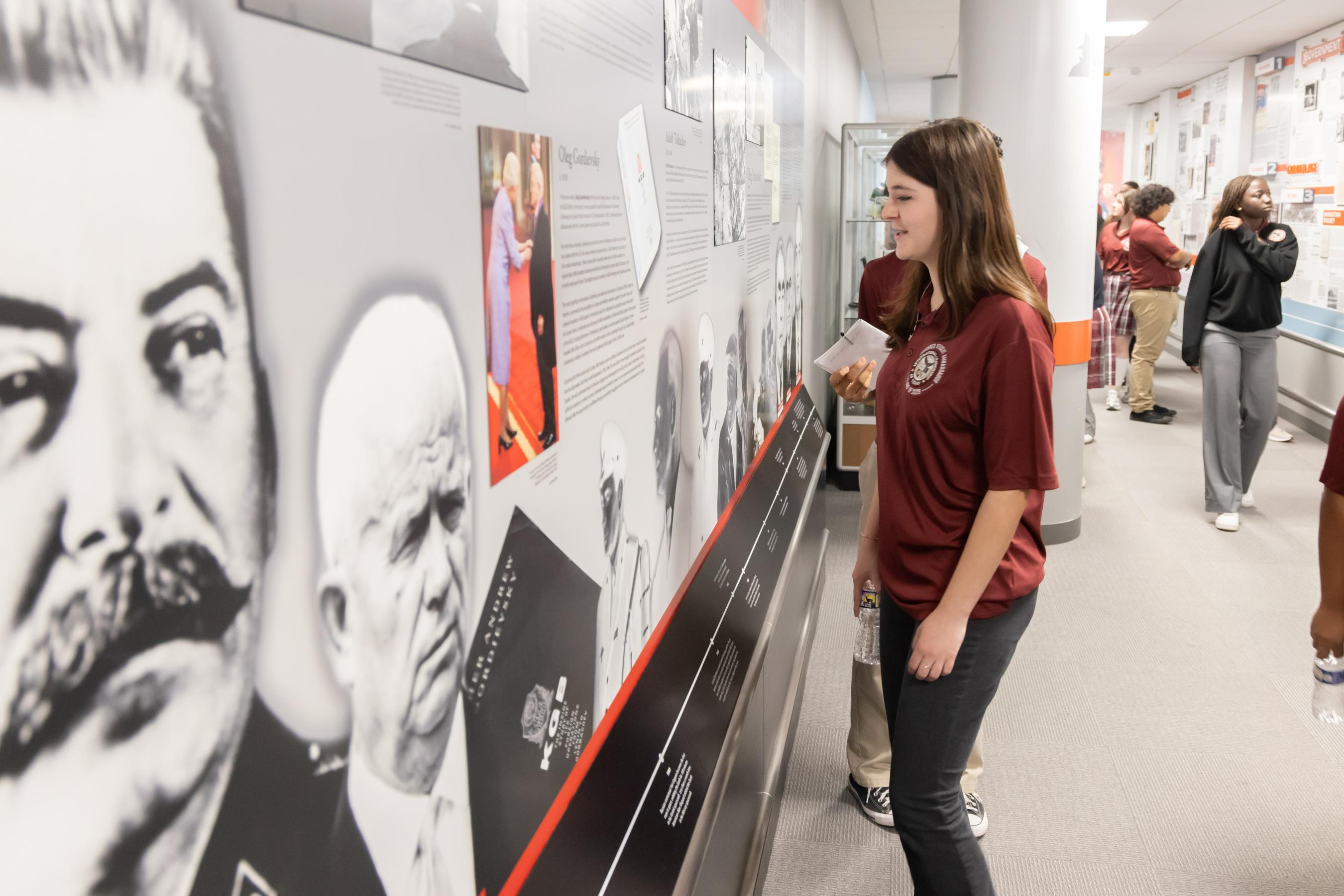An International Leadership of Texas student reads the “Wall of Spies” exhibit on October 10 at Intelligence Community Campus-Bethesda (ODNI Photos).
Raise your hand if you’ve ever wondered whether aspects of your favorite spy movies are real?
This question prompted all 36 high school seniors to send their hands toward the ceiling at Intelligence Community Campus-Bethesda (ICC-B) on October 10.
Moments later, the top-ranked seniors from International Leadership of Texas — a public charter school with 25 campuses — were asking officers with foreign language expertise from the National Security Agency (NSA), U.S. Cyber Command, State Department, Federal Bureau of Investigation (FBI), Defense Intelligence Agency (DIA), National Geospatial-Intelligence Agency (NGA), National Virtual Translation Center (NVTC) and Central Intelligence Agency (CIA) what it was truly like to work in the U.S. Intelligence Community (IC).
It was a rare chance for high school students to speak with a panel of language analysts and intelligence officers who use their language skills every day to make sure that those who make national security decisions understand the intentions of U.S. adversaries and bad actors around the world.
But for IC representatives, the moment was equally important.
The overwhelming majority of the intelligence the IC collects is in foreign languages, which means the community relies on officers with foreign language expertise to make sense of what they are collecting.
“In the United States, our K-16 education system doesn’t prioritize learning foreign languages,” said Ewa Zeoli, a program manager with the ODNI Foreign Language team that organized the event. “In International Leadership of Texas, we have this exceptional K-12 school district of 26,000 students that has a systematic approach of teaching multiple foreign languages.”
ILTexas, which has schools in and around the cities of Dallas-Fort Worth, Houston, Cleveland, and College Station, had a minority student population of 90 percent in 2021, according to U.S. News & World Report. This includes many students who speak languages other than English at home. Along with English, every student at ILTexas also learns Spanish and Chinese throughout their primary and secondary school.
“We have more kids studying Chinese than any school system in America,” said the school’s founder and superintendent Eddie Conger.
The 20-year Marine Corps veteran said he founded the school 11 years ago with 2,500 students. ILTexas has rapidly expanded with more than 3,000 new students added and three new K-8 schools opened in the past year. School officials emphasize servant leadership and to live by the school’s motto, “Others before self.”
Zeoli pointed to the National Intelligence Strategy to explain why ILTexas’ unique model is so important to the IC. The first goal of the strategy focuses on positioning the IC for intensifying strategic competition – especially against the People’s Republic of China. The second goal focuses on recruiting, developing and retaining a talented and diverse workforce. In ILTexas, Zeoli sees both goals. Her team led the creation of the IC Foreign Language Strategy 2024-27 that prioritizes recruiting, developing and maintaining a diverse foreign language workforce.
“Here we have this amazing student population with expertise in foreign languages, a global perspective, leadership training and a desire to serve,” she said. “That’s why we’ve been so excited to partner with them.”

ILTexas graduating seniors participated in a similar IC event in September of 2023 and Zeoli visited ILTexas schools earlier this year, speaking to around 600 students.
“We have to build awareness of what civil servants do and how important it is for the nation as early as we can in high school and even in middle school,” said Zeoli. “We need to teach them what we do in the IC and how foreign language knowledge removes boundaries and promotes mutual understanding.”
During the panel discussion, a DIA officer who spent 16 years of his career in China discussed working on a maritime agreement that the U.S. drew up to prevent American and Chinese naval ships from coming into conflict as they meet around the world. But the officer explained to students that there was confusion with the agreement when the text was translated to Chinese. The word “Ānquán” was used in place of safety — the key word in the agreement. But “Ānquán” can also mean security, which led Chinese officials to see American attempts to promote safety instead as a strategic act to gain an upper hand in their strategic competition. He shared the story to explain the importance of cultural understanding and interpretation of meaning in the IC’s work.
Each officer also shared which languages they speak and what impact this knowledge has had on their IC careers. An FBI official who specializes in Russian and Spanish said she travels often to assist in investigations and feels good that she is helping solve crimes. An official with the State Department’s Bureau of Intelligence and Research commented on how learning Chinese has changed his life more than anything else he has ever done. He now provides expertise on human rights violations taking place in China.
“Most of the time when you hear about FBI and CIA agents, it’s so secretive, so it was nice seeing their faces and learning about their experiences,” said an ILTexas senior. “It has changed my perspective.”
The students also learned about educational programs and career opportunities, such as the National Security Education Program’s (NSEP) Flagship and Borens programs, and student internship programs at the NSA. They had an opportunity to talk to representatives at the agencies’ tables and ask questions about next steps. The visit ended with a tour of the National Counterintelligence and Security Center’s Wall of Spies.
“Y’all opening up and allowing the kids to hear about all of this is just providing them another opportunity they would’ve never known about,” he said.





